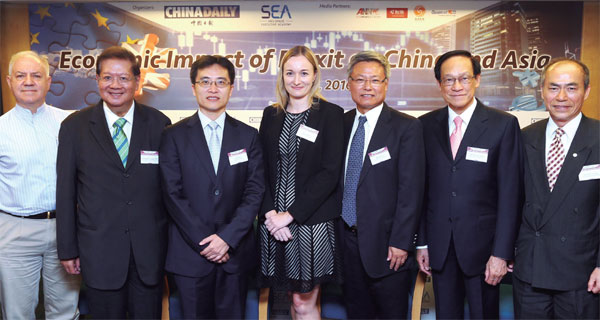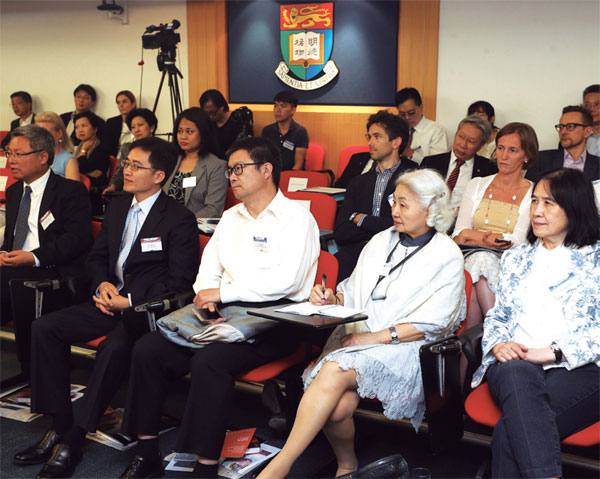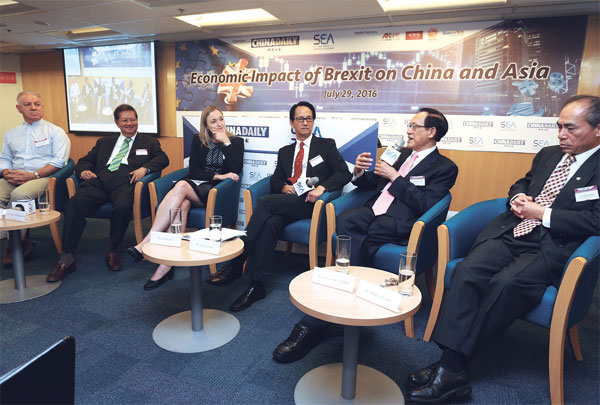Brexit a 'new beginning' for Sino-British trade
Updated: 2016-08-02 07:54
By Zhou Mo and Lin wenjie in Hong Kong(HK Edition)
|
|||||||||
|
Panelists pose for photos with Zhou Li (third left), editorial board member of China Daily Group and publisher and editor-in-chief of China Daily Asia Pacific, at a roundtable forum on the UK's ties with Hong Kong and the Chinese mainland on Friday in Hong Kong. Experts believe that Brexit will not terminate economic globalization, as a closer economic bond between the UK and China will help cushion the impact and breathe new life into both sides amid global economic slowdown. Photos by Edmond Tang / China Daily |
|
The roundtable has the attention of Elsie Leung Oi-sie (second right, front row), deputy director of the HKSAR Basic Law Committee and former secretary for justice. |
Britain's exit from the European Union (EU), known as Brexit, though raising uncertainties across the world, also signals a "new beginning" that will bring more investment opportunities and closer ties with Hong Kong, the Chinese mainland and Asia, experts and researchers told a roundtable forum in Hong Kong on Friday.
Brexit, which triggered a sharp depreciation of the British pound against major currencies including the renminbi, will reduce risks for Chinese companies to do business in the UK, said Jo Hawley, director of trade and investment of British Consulate General Hong Kong.
Buyers from China will find it cheaper to invest in UK properties, she said, adding that Chinese tourists and students will spend less when visiting and studying in the Western country.

"The depreciation of the British pound after Brexit is already providing opportunities for investment in Britain," Hawley told the forum themed "Economic Impact of Brexit to China and Asia", organized by China Daily Asia Pacific.
By July 3, 10 days after Britain's referendum on whether to leave the EU, the British pound had dipped more than 10 percent, from 9.84 yuan ($1.48) per pound to 8.83 yuan.
"In the long term, leaving the EU means that the UK will be free to sign its own trade deals with other countries, such as a free trade agreement with China," Hawley added.
Tse Kwok-leung, head of policy and economic research at Bank of China (Hong Kong) Ltd, believes Brexit will be beneficial to Hong Kong, as relations between the two sides will become closer.
"Brexit's impact on Hong Kong is rather insignificant because direct contact between the two places is limited. I believe that after Brexit, Britain will not be alienated from Hong Kong, but they will become closer, for Britain will be free to sign its own trade deals," Tse said.
David Dodwell, executive director of Hong Kong-APEC Trade Policy Study Group, however, doubts whether a bilateral trade agreement between the UK and another country or area works effectively at a time of globalization.
"Large companies have supply chains that span 10 to 15 countries (and regions). If trade arrangements don't embrace all these countries, it is not helpful. Most of the trade agreements in Asia now embrace regional agreements."
Instead of being optimistic toward Brexit, he pointed out that job opportunities and economic development may also be affected.
"The outcome of Brexit will be catastrophic and the price paid will be substantial for a very long time, because to negotiate how to exit the EU is a very long process, which may cause job uncertainties, career uncertainties, economic stagnation and so on," Dodwell said.
Michael Yeoh, co-founder and chief executive officer of the Asian Strategy and Leadership Institute, meanwhile, warned that the uncertainties arising from Brexit and the drop in the pound may weaken UK companies' investment in Asia.
Maximizing benefits
The UK is China's second largest trading partner in the European Union and China is also the UK's second largest outside the EU. Bilateral trade between the two countries amounted to $91.03 billion last year, according to the Ministry of Commerce.
Edward K.Y. Chen, president of Qianhai Institute for Innovative Research, said while there would be a long transition period following Brexit, the most important thing in the process is to "minimize short-term cost and maximize long-term benefits".
"To minimize short-term cost, the first thing for Britain to do is to stabilize its economy. That means to stabilize the exchange rate of the pound in order to restore confidence and trust for investors. The second thing for Britain is to assure the world that London will stay as the No 1 financial center in the world. Meanwhile, the third thing is how Britain will manage its trade with the EU in the post-Brexit era," Chen noted.
In the long term, he added, how much benefits the UK will reap from the decision depends on how the country manages its relationship with the international world.
Chen said he is not concerned about that as the Belt and Road Initiative, proposed by President Xi Jinping in 2013 to strengthen international trade and economic cooperation by improving connectivity, provides a new channel for Britain to build relations with all the economies along the route.
"Brexit will not end economic globalization," Chen said. Instead, it is "a new beginning that will bring new economic opportunities".
Contact the writers at sally@chinadailyhk.com
|
Panelist Edward K. Y. Chen (second right) said the first thing for Britain to do is to stabilize its currency as well as its economy. |
|
Audience members listen to the roundtable as panelists share their views on Sino-British trade after the Brexit. |
(HK Edition 08/02/2016 page11)



